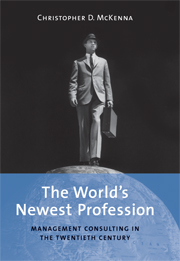24 results
Consensus Standard for Evidence Integration into EMS Education and High-Stakes Testing
-
- Journal:
- Prehospital and Disaster Medicine / Volume 38 / Issue 3 / June 2023
- Published online by Cambridge University Press:
- 04 May 2023, pp. 338-344
- Print publication:
- June 2023
-
- Article
-
- You have access
- Open access
- HTML
- Export citation
A history of high-power laser research and development in the United Kingdom
- Part of
-
- Journal:
- High Power Laser Science and Engineering / Volume 9 / 2021
- Published online by Cambridge University Press:
- 27 April 2021, e18
-
- Article
-
- You have access
- Open access
- HTML
- Export citation
Contributors
-
-
- Book:
- Essential Clinical Anesthesia
- Published online:
- 05 January 2012
- Print publication:
- 11 July 2011, pp xv-xxviii
-
- Chapter
- Export citation
In Memoriam: Alfred Chandler and the Soul of Business History
-
- Journal:
- Enterprise & Society / Volume 9 / Issue 3 / September 2008
- Published online by Cambridge University Press:
- 18 February 2015, pp. 422-425
- Print publication:
- September 2008
-
- Article
-
- You have access
- Export citation
McKinsey's Marvin Bower: Vision, Leadership and the Creation of Management Consulting. By Elizabeth Haas Edersheim. New York: John Wiley, 2004. xiii + 305 pp. Figures, notes, index. Cloth, $29.95. ISBN: 0-471-65285-7.
-
- Journal:
- Business History Review / Volume 80 / Issue 2 / Summer 2006
- Published online by Cambridge University Press:
- 13 December 2011, pp. 381-383
- Print publication:
- Summer 2006
-
- Article
- Export citation
Introduction. Making a Career of Consulting
-
- Book:
- The World's Newest Profession
- Published online:
- 18 August 2009
- Print publication:
- 19 June 2006, pp 1-7
-
- Chapter
- Export citation
Contents
-
- Book:
- The World's Newest Profession
- Published online:
- 18 August 2009
- Print publication:
- 19 June 2006, pp xi-xii
-
- Chapter
- Export citation
Frontmatter
-
- Book:
- The World's Newest Profession
- Published online:
- 18 August 2009
- Print publication:
- 19 June 2006, pp i-x
-
- Chapter
- Export citation
Notes
-
- Book:
- The World's Newest Profession
- Published online:
- 18 August 2009
- Print publication:
- 19 June 2006, pp 253-356
-
- Chapter
- Export citation
4 - Creating the Contractor State: Consultants in the American Federal Government
-
- Book:
- The World's Newest Profession
- Published online:
- 18 August 2009
- Print publication:
- 19 June 2006, pp 80-110
-
- Chapter
- Export citation
1 - Economies of Knowledge: A Theory of Management Consulting
-
- Book:
- The World's Newest Profession
- Published online:
- 18 August 2009
- Print publication:
- 19 June 2006, pp 8-25
-
- Chapter
- Export citation
9 - Watchdogs, Lapdogs, or Retrievers? Liability and the Rebirth of the Management Audit
-
- Book:
- The World's Newest Profession
- Published online:
- 18 August 2009
- Print publication:
- 19 June 2006, pp 216-244
-
- Chapter
- Export citation
3 - How Have Consultants Mattered? The Case of Lukens Steel
-
- Book:
- The World's Newest Profession
- Published online:
- 18 August 2009
- Print publication:
- 19 June 2006, pp 51-79
-
- Chapter
- Export citation
6 - The Gilded Age of Consulting: A Snapshot of Consultants Circa 1960
-
- Book:
- The World's Newest Profession
- Published online:
- 18 August 2009
- Print publication:
- 19 June 2006, pp 145-164
-
- Chapter
- Export citation
Acknowledgments
-
- Book:
- The World's Newest Profession
- Published online:
- 18 August 2009
- Print publication:
- 19 June 2006, pp xv-xxii
-
- Chapter
- Export citation
5 - Finding Profit in Nonprofits: The Influence of Consultants on the Third Sector
-
- Book:
- The World's Newest Profession
- Published online:
- 18 August 2009
- Print publication:
- 19 June 2006, pp 111-144
-
- Chapter
- Export citation
Conclusion.The World's Newest Profession?
-
- Book:
- The World's Newest Profession
- Published online:
- 18 August 2009
- Print publication:
- 19 June 2006, pp 245-252
-
- Chapter
- Export citation

The World's Newest Profession
- Management Consulting in the Twentieth Century
-
- Published online:
- 18 August 2009
- Print publication:
- 19 June 2006
2 - Accounting for a New Profession: Consultants' Struggle for Jurisdictional Power
-
- Book:
- The World's Newest Profession
- Published online:
- 18 August 2009
- Print publication:
- 19 June 2006, pp 26-50
-
- Chapter
- Export citation
8 - Selling Corporate Culture: Codifying and Commodifying Professionalism
-
- Book:
- The World's Newest Profession
- Published online:
- 18 August 2009
- Print publication:
- 19 June 2006, pp 192-215
-
- Chapter
- Export citation



